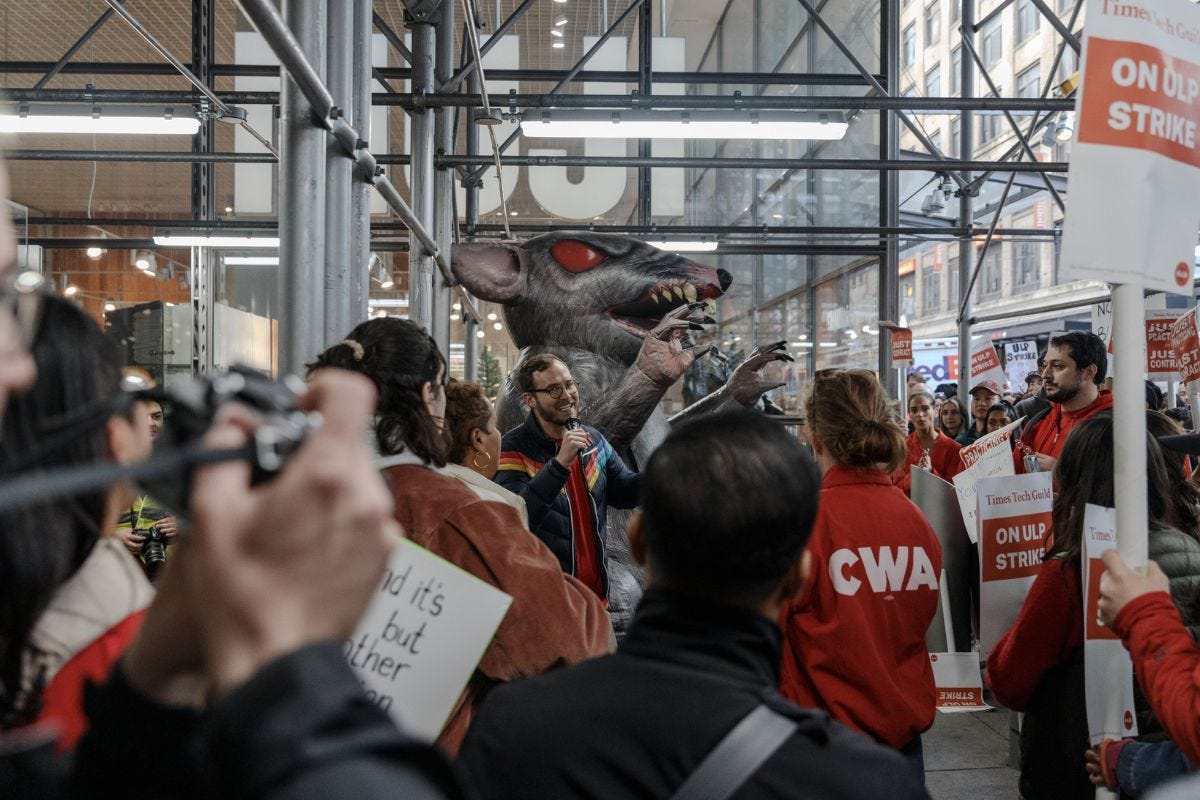Time For A New Playbook?
A call for new strategies to rebuild the tech worker movement.

At the end of the 2010s, the tech worker movement felt unstoppable. Collective actions were surging, with workers protesting en masse against military contracts, sexual harassment, racial discrimination, and exploitative business practices. Walkouts, open letters, and workplace actions captured headlines and forced tech giants to respond. Tech activism was no longer only propelled by a handful of fringe worker-activists but by broad participation. And with the media on the workers’ side, the imagination that a tech worker movement could reform the industry was within reach.
As workers gained experience and the movement matured, so did our organizing strategies. Workers realized that we needed structural power to attain lasting change at our workplaces. Following the example of Kickstarter United’s wall-to-wall union victory, tech organizers increasingly moved underground, building internal and sustainable solidarity. Public petitions and media campaigns gave way to stealth organizing, base-building, and a focus on winning union campaigns. And with national unions like CWA and OPEIU offering guidance and resources, the promise of a unionized workforce in tech was on the horizon.
Fast forward to 2023, in the wake of mass layoffs and plummeting working conditions in the industry, the optimism that fueled the drive for unionization has been tested. While class consciousness among tech workers has undoubtedly grown, the organizing terrain has become far more hostile. Rising interest rates and the accelerated adoption of AI have given companies convenient pretexts to slash jobs and restructure their workforces in a way that reaffirms their control and disadvantages workers. The result has been higher employee churn, increased workloads, and widespread precarity, making it increasingly difficult to maintain the stable organizing core required to win union elections or sustain pressure campaigns.
At the same time, management has gone on the offensive. Tech executives have become more vocally anti-worker, and billionaire class consciousness is actively being harnessed. In a recent interview with The New York Times, venture capitalist Marc Andreessen warned that “companies are basically being hijacked into engines of social revolution,” claiming that employee bases had “gone feral” and that during the Trump years, some firms felt like they were just “hours away from full-blown violent riots on their own campuses.”
Behind this fear-mongering, employers are doing everything they can to reassert control across an employee base that had, in the eyes of management, taken workplace activism too far. Surveillance is being expanded. Entire departments have been dissolved at the first hint of organizing. Companies like Grindr are willing to force out the majority of their workforce or, like Bandcamp, sell to a larger firm after organizing takes root. The flexible, worker-friendly norms that defined tech’s 2010s workplace culture have been systematically dismantled, and even demonized by management.
Today, the tech worker movement is in crisis. Collective actions have fallen to a fraction of the 2019 peak (see our archive of collective actions in tech). Hard won unions have been halted or eroded. New union campaigns have slowed. And today’s organizers are up against a much harsher environment where the costs of speaking out are high and the slow strategies of building union campaigns are harder to sustain.
If the movement is to survive, we must adapt to this changed terrain. This is a time to reset and evaluate the organizing strategies we’ve relied on.
Has the Jane McAlevey playbook, which so many tech worker organizers have come to depend on, been working for you in this new environment? Are your organizing practices sensitive to the dynamics of your workplace and the tech labor process? Have you and your coworkers been discussing different paths and strategies that could win what many of us joined the movement for: sustained workplace democracy?
We want to hear from you. We’re launching a new series as part of this newsletter to highlight the problems that workers are facing in this new environment, to discuss emergent tactics, and to highlight new breakthroughs in tech worker organizing. We hope this series will help us interrogate our current organizing strategies and inspire greater experimentation.
If you’re a tech worker that has been involved with organizing the industry, we invite you to submit your critiques of existing tactics as well as suggestions for new ones. Your submissions do not need to be polished, and we can work with you to develop them into short pieces.
Submissions are open until July 30th, 2025. Please send your responses to hello@collectiveaction.tech
Upcoming Events
Some members of Collective Action in Tech will be at FAccT 2025 to host the hybrid workshop “AI Workers’ Inquiry.” This workshop brings together workers, organizers, and labor experts to explore how AI is transforming our workplaces and discuss strategies for collective resistance. RSVP and more info here: https://ai-workers-inquiry.github.io/
We’re co-organizing the Circuit Breakers 2025 conference with the Tech Workers Coalition. We recently put out a call for proposals (due June 30th) for the conference, happening on Oct 18-19 in NYC. Submit an idea here: https://techworkerscoalition.org/circuit-breakers/
What we’re reading:
Tech Equity has come out with a fantastic resource that maps the AI labor supply chain. Big Tech companies contract with smaller companies who will hire workers, often from the Global South, to annotate data and fine-tune AI models. Workers face low pay, job insecurity, and long hours of monotonous labor. Transparency into the global AI supply chain is the first step towards accountability and justice for workers.
The Tech Workers Coalition recently penned a blog post on the EWOC site about tech organizing and the need for tech workers to act in solidarity with the immigrant community, immigrant organizations



A clear eyed reckoning of the arc of collective action in the tech industry and an opening of the discourse for new ideas among the changing political and economic climate of today!